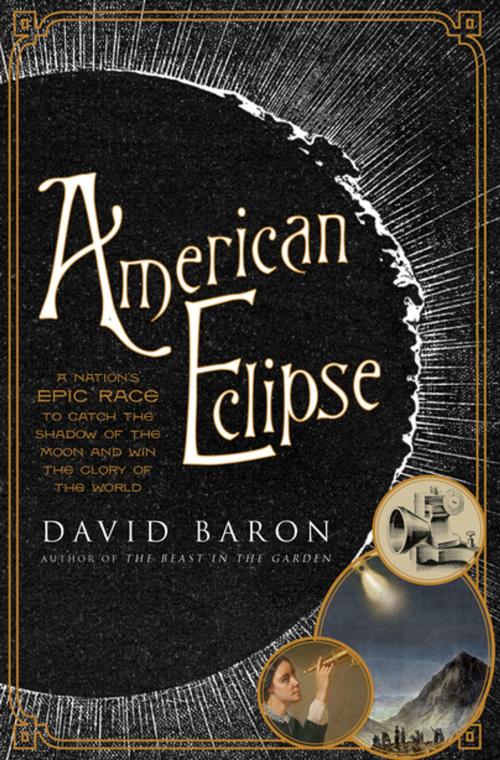American Eclipse: A Nation's Epic Race to Catch the Shadow of the Moon and Win the Glory of the World
Nonfiction, Science & Nature, Science, Physics, Astronomy, Other Sciences, History, Americas, United States, 19th Century| Author: | David Baron | ISBN: | 9781631490170 |
| Publisher: | Liveright | Publication: | June 6, 2017 |
| Imprint: | Liveright | Language: | English |
| Author: | David Baron |
| ISBN: | 9781631490170 |
| Publisher: | Liveright |
| Publication: | June 6, 2017 |
| Imprint: | Liveright |
| Language: | English |
This “suspenseful narrative history” (Maureen Corrigan, NPR) brings to life the momentous eclipse that enthralled a nation and thrust American science onto the world stage.
On a scorching July afternoon in 1878, at the dawn of the Gilded Age, the moon’s shadow descended on the American West, darkening skies from Montana Territory to Texas. This rare celestial event—a total solar eclipse—offered a priceless opportunity to solve some of the solar system’s most enduring riddles, and it prompted a clutch of enterprising scientists to brave the wild frontier in a grueling race to the Rocky Mountains. Acclaimed science journalist David Baron, long fascinated by eclipses, re-creates this epic tale of ambition, failure, and glory in a narrative that reveals as much about the historical trajectory of a striving young nation as it does about those scant three minutes when the blue sky blackened and stars appeared in mid-afternoon.
Lauded as a “sweeping, compelling” (Wall Street Journal) work of science history, American Eclipse tells the story of the three tenacious and brilliant scientists who raced to Wyoming and Colorado to observe the rare event. Dedicating years of “exhaustive research to reconstruct a remarkable chapter of U.S. history” (Scientific American), award-winning writer David Baron brings to three-dimensional life these competitors—the planet-hunter James Craig Watson, pioneering astronomer Maria Mitchell, and the ambitious young inventor Thomas Edison—to thrillingly re-create the fierce jockeying of nineteenth-century American astronomy. With spellbinding accounts of train robberies and Indian skirmishes, the mythologized age of the Wild West comes alive as never before. An “enthralling” (Daniel Kevles) and magnificent portrayal of America’s dawn as a scientific superpower, American Eclipse depicts a young nation that looked to the skies to reveal its towering ambition and expose its latent genius.
This “suspenseful narrative history” (Maureen Corrigan, NPR) brings to life the momentous eclipse that enthralled a nation and thrust American science onto the world stage.
On a scorching July afternoon in 1878, at the dawn of the Gilded Age, the moon’s shadow descended on the American West, darkening skies from Montana Territory to Texas. This rare celestial event—a total solar eclipse—offered a priceless opportunity to solve some of the solar system’s most enduring riddles, and it prompted a clutch of enterprising scientists to brave the wild frontier in a grueling race to the Rocky Mountains. Acclaimed science journalist David Baron, long fascinated by eclipses, re-creates this epic tale of ambition, failure, and glory in a narrative that reveals as much about the historical trajectory of a striving young nation as it does about those scant three minutes when the blue sky blackened and stars appeared in mid-afternoon.
Lauded as a “sweeping, compelling” (Wall Street Journal) work of science history, American Eclipse tells the story of the three tenacious and brilliant scientists who raced to Wyoming and Colorado to observe the rare event. Dedicating years of “exhaustive research to reconstruct a remarkable chapter of U.S. history” (Scientific American), award-winning writer David Baron brings to three-dimensional life these competitors—the planet-hunter James Craig Watson, pioneering astronomer Maria Mitchell, and the ambitious young inventor Thomas Edison—to thrillingly re-create the fierce jockeying of nineteenth-century American astronomy. With spellbinding accounts of train robberies and Indian skirmishes, the mythologized age of the Wild West comes alive as never before. An “enthralling” (Daniel Kevles) and magnificent portrayal of America’s dawn as a scientific superpower, American Eclipse depicts a young nation that looked to the skies to reveal its towering ambition and expose its latent genius.















